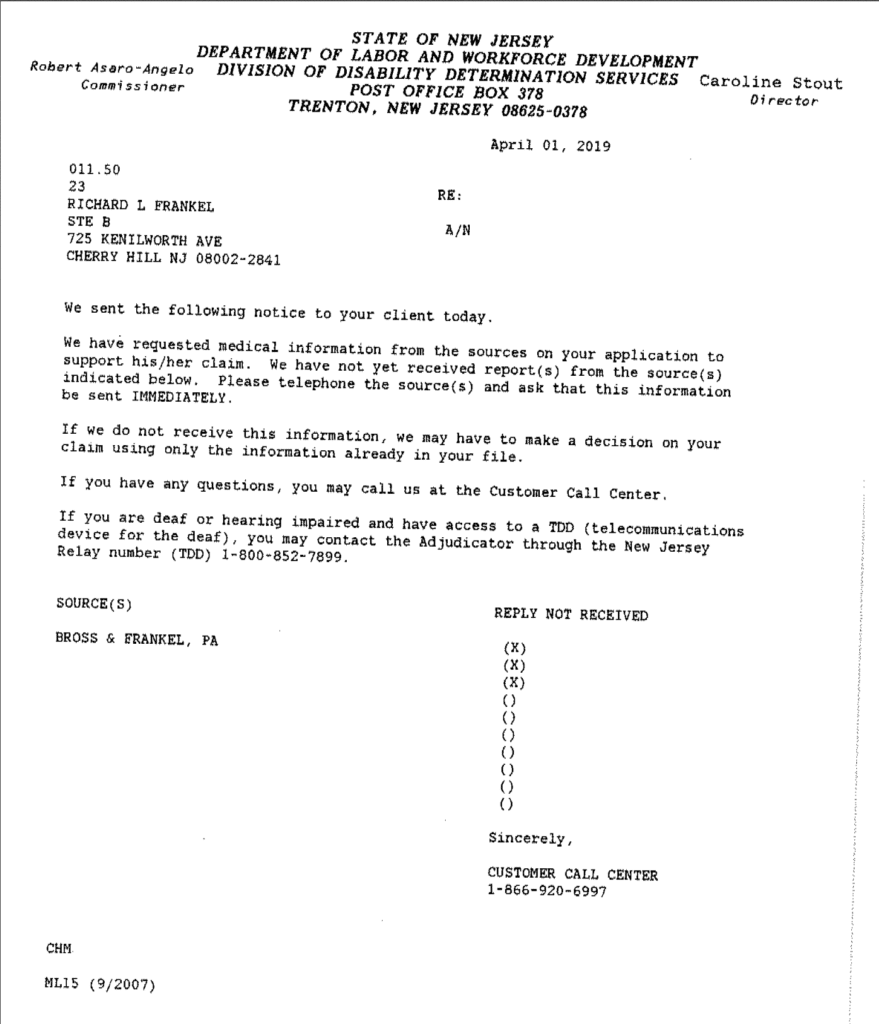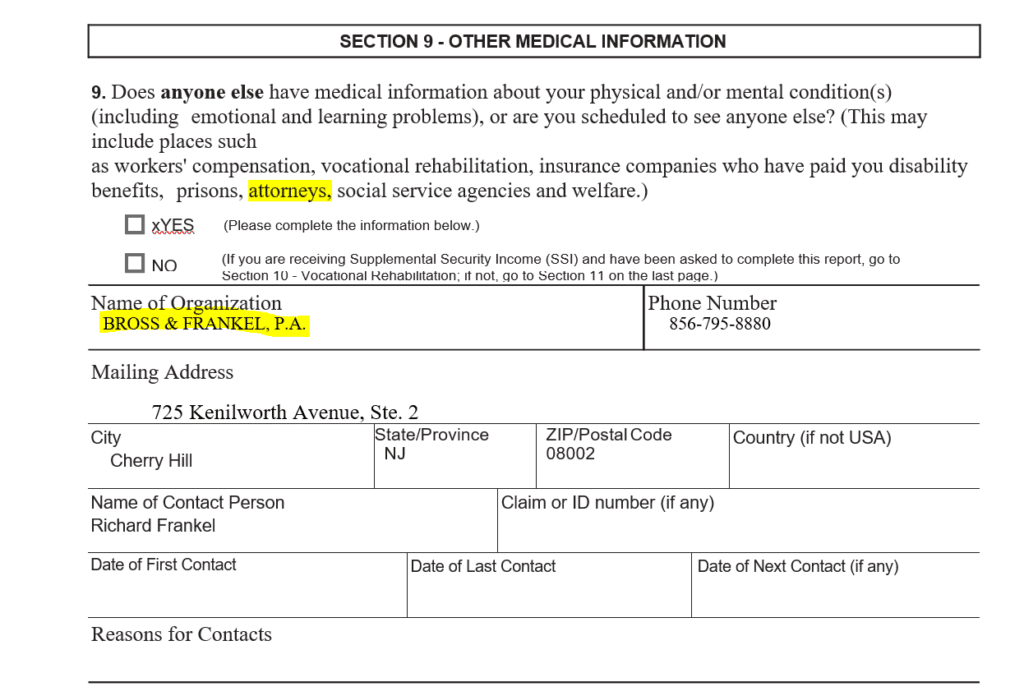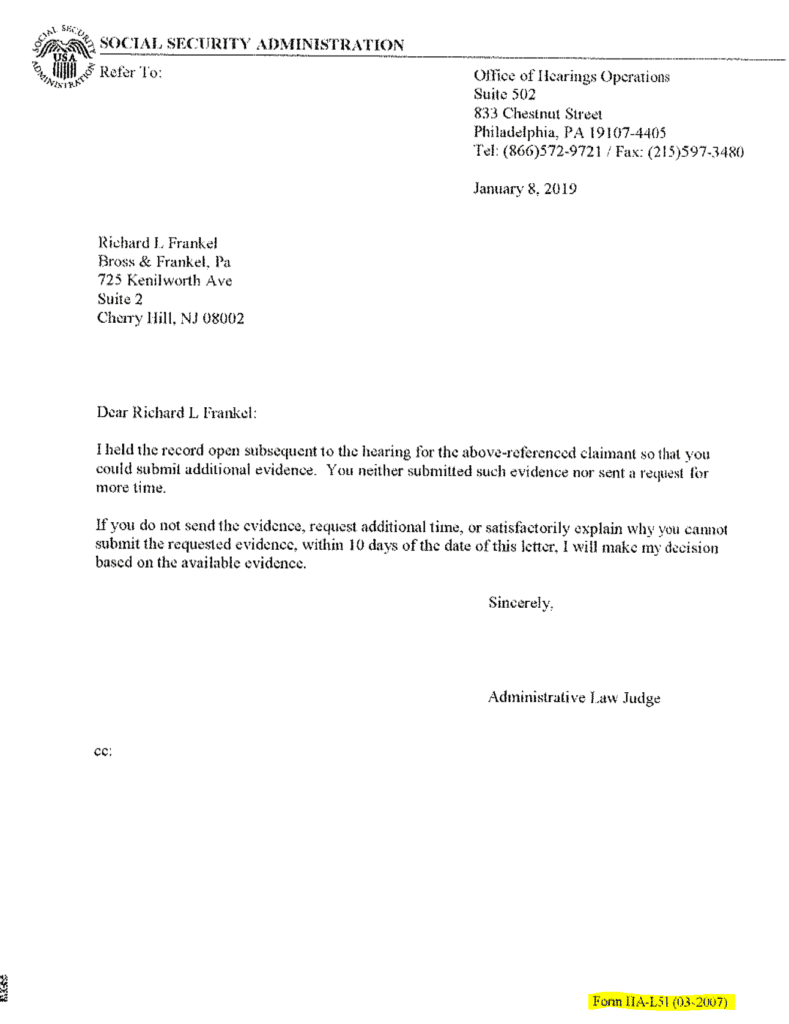Social Security has one true love. That love is form letters. There’s nothing scandalous about this statement. The SSA is an enormous government agency responsible for administering complicated benefits to millions of Americans. That said, they’re not very good at it.
Most of the calls we have with our clients are productive. We’re getting updates on medical records, we plan strategy, deliver updates, and work with our clients to get results. However, thanks to Social Security’s love-of-the-form, I can predict my clients will call me, upset that they believe we are not doing our job based on several form letters.
So, to show my incredible psychic powers, and to help other practitioners dealing with these same letters, I am attaching each letter here, explaining what they are, and why they do not mean that your disability attorney isn’t doing what he or she is supposed to do.
The Customer Call Center Letter.

At the initial and Reconsideration levels of Social Security disability and
Supplemental Security Income Claims, this letter gets generated automatically,
and seems dire. With the stylistic flare
of an old dot matrix printer, it provides a simple list of the offending
parties who have not provided requested evidence.
But, as you can see from the redacted letter, our law firm is listed. “Why is my lawyer holding up my claim?” “Why aren’t you sending Social Security what they need?” These questions seem absolutely fair based on our presence on the letter. The problem is that our name will always be on this letter regardless of what we submit or how much work we’ve done to provide Social Security with all of the needed evidence.
Our name is on here in the first place because we identify ourselves as a source of information other than a medical provider on the Disability Report – Adult (Form 3368). And, as you can see in the highlighting below, this makes sense both because we are an attorney, and also, because we’d like Social Security to understand that we’re involved in a case.
But, because we spend our energy getting the medical evidence and opinions needed to win the claim, we don’t generate our own evidence – we’re not treating our clients and so there is nothing of “ours” to submit. And so, even after every last scrap of available evidence has been submitted, our name may still show up.

The Post-Hearing “Nastygram”
So, we went to a hearing. And sometimes there is evidence that we just can’t get in time. But Social Security has made life harder by requiring that we submit or inform the judge of all evidence at least five business days before a hearing. We usually get this done, but sometimes, we have to “inform” them of evidence we know about but haven’t been able to get. Because perhaps you just started seeing a new provider, or the doctor requires a special authorization to allow for release, or they’re just not getting back to us. Judges have a lot of discretion in how to handle this, and so generally, if we’ve at least let them know it exists, they may hold the record open to allow us time after the hearing to get the remaining evidence.
So,
let’s say the judge agrees to hold the record open for 30 days. Cool.
We go out and get that remaining evidence and submit it. Also cool.
The judge wants to let us know that he or she is going to close the
record after the expiration of the time period we agreed to hold the record
open, so that we can submit anything else that might be outstanding. So far, so good. We’re all pulling in the same direction. Not so fast!
Social Security’s love of the form letter strikes again. Here is the letter that gets sent whether we have submitted all of the evidence
discussed or not (our office almost always has, and in the rare cases
that we haven’t been able to get the evidence, we provide the judge with an
update and explanation). Take a look at
the letter they send:

No matter what we do or send, we will only receive Form HA-L51, which states, misleadingly: “You neither submitted such evidence nor sent a request for more time.” I’ve discussed this with a chief ALJ who has admitted how this could possibly be harmful to our relationship with our clients, and acknowledged that it is a national form letter that local offices cannot change. (Sometimes judges won’t send any letter at all if they take the time to review the file, but this is not about those happy times).
Imagine getting this letter! Because the judge was kind enough to hold the record open, this must mean your disability lawyer blew it! I have this conversation regularly with my clients. We submit our evidence electronically and keep the receipts. And, most of the time the evidence has been reviewed and added to the official exhibit list by hearing office staff before this letter even goes out.
And here’s a helpful option for what this letter should say: I held the record open subsequent to the hearing for the above-reference claimant so that you could submit additional evidence. Because the time period I agreed to hold the record open is now coming to a close, this is to notify you that any additional evidence must be submitted within 10 days of the date of this letter. I will then make my decision based on the available evidence.
It’s not hard, but because of poor form design, we spend a lot of time reassuring our client that we are doing the work needed to win their case. It’s unfortunate that Social Security has to add anxiety after the hearing when you are desperately trying to get to the end and get a favorable decision on your claim. But there’s nothing we can do about it. All we can do is make sure they’re absolutely wrong before they send this letter.
The Hearing Acknowledgement that holds the Promise of a Favorable Decision Without a Hearing
This last one is a bit more nuanced. This is the second page of the initial letter we receive after we’ve requested a hearing. It provides the forms requesting standard updates. But it generates urgency and the hope that this whole “hearing” thing might just not have to happen by saying “As soon as you submit the foregoing, we will review your case to determine if we can make a fully favorable decision without holding a hearing.”
And this creates two beliefs: 1) something is missing that hasn’t been submitted and 2) as soon as it’s submitted, the hearing office will take a look to see if they can just say “yes!” already. Unfortunately “on the record” reviews or OTR approvals are incredibly rare. But, that’s not to say they don’t happen, but the vast majority of claims go to a hearing. Most hearing office staffs are time-strapped with limited resources and budgets to handle claims.
But your attorney may recommend requesting an OTR decision if there are unusual facts (for example, you meet a listing that hasn’t been considered, or new and critical evidence has come to light that couldn’t have been considered previously), but most cases that are going to get approved are going to be because the judge had the opportunity to sit down and speak with you, to understand your condition on a personal level.

While this letter isn’t as damaging as the other two, or at least doesn’t flatly accuse your disability attorney of not doing their job. But, Social Security’s love of form letters creates nothing but stress. So, my hope is, by posting these letters here, either before you ever see them or perhaps in researching what they mean, it will expose them for what they are: badly written form letters that do not offer any insight into what’s actually going on in your disability claim.
And, if you have any questions about your own claim, don’t hesitate to contact us. Do you have a war story about a bad form letter that almost stopped your heart? Always interested to hear.

Rich Frankel is the managing partner of Bross & Frankel. He is a member of the New Jersey and Pennsylvania bars. He has focused exclusively on disability and social security benefits since 2005.
Mr. Frankel joined what is now Bross & Frankel after having watched his father struggle with disability, fighting a lengthy illness. Mr. Frankel founded the firm’s veteran’s law practice and substantially grew the social security disability practice, focusing Bross & Frankel’s ability to fight for all of the disability benefits available to his clients.
Mr. Frankel additionally fights for clients in court, obtaining frequent victories in Social Security appeals and against insurance companies in Federal court.